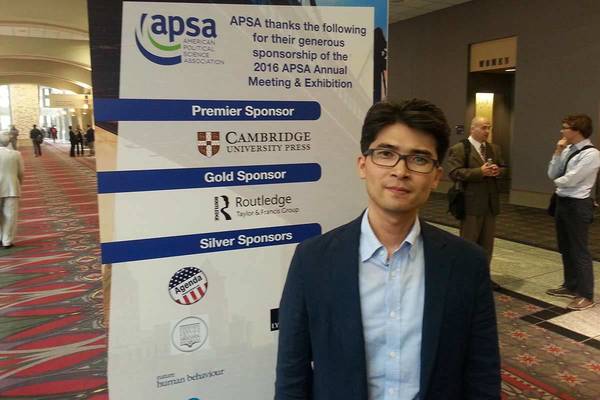
Graduate Education: Rising to the Next Level
Graduate students aspire to be part of the future of European studies. To be competitive, they need to present their work at professional conferences and receive constructive criticism from scholars outside the campus in South Bend. This year, the Institute supported twenty-five students pursuing this kind of professional development. Students presented work in theology, history, philosophy, medieval studies, literature, anthropology, sociology, and political science.
Applications for the Nanovic Institute's Graduate Professional Development Grants will be accepted throughout the academic year until April 2, 2018 or funds are depleted.
View full details or contact the student coordinator.
The grant enabled me to enhance the quality of my working paper, expand the range of my scholarly network, and increase the chance of my job placement.
Shinkyu (James) Lee
DOCTORAL CANDIDATE POLITICAL SCIENCE AND PEACE STUDIES
Graduate Professional Development Grant
I am writing to report my paper presentation at the annual meeting of the American Political Science Association in September 1-4, 2016. My paper entitled “Defiant Realism: Arendtian Reflections on Peace” was well received. One of discussants mentioned that “the paper is just about ready to go to the journals.” As the final presentation in the panel entitled “Realism,” my paper established a context for the following discussion of how to apply realist insights to practical contexts of (domestic or international) politics. But I also received constructive critiques. One panelist urged me to articulate “whether there is a difference between defiant realism and worldly peacebuilding.”
Indeed, this is an important conceptual issue this paper needs to resolve. Deciding whether the two concepts are equivalent, or whether defiant realism is a general political morality that implies worldly peacebuilding as a conception of peacebuilding, should sharpen the point I want to make. I plan to incorporate these comments into my future revision of the paper. I also attended several panels that are highly relevant to my dissertation research. The panel entitled “Conditions of Agonistic Politics” was particularly useful. Drs. Andrew Schaap and James Ingram, paper presenters in this panel, are important commentators on the implications of Hannah Arendt’s thought for human rights theory and practice—a research topic that part of my current project deals with. I also met with Dr. Mark Wenman who I quote in my dissertation to discuss some of the problems with contemporary cosmopolitanism. Through the APSA conference, I was able to expand my scholarly network.
Last by no means least, I used attending to the 2016 APSA meeting as an opportunity for my job search. I did job interviews with two liberal art colleges. I came to learn that there are growing needs in the job market for my teaching and research fields.
The Graduate Professional Development Grant of the Nanovic Institute for European Studies enabled me to enhance the quality of my working paper, expand the range of my scholarly network, and increase the chance of my job placement. I am grateful for the generosity of the Nanovic grant that made my APSA conference experience fulfilling.